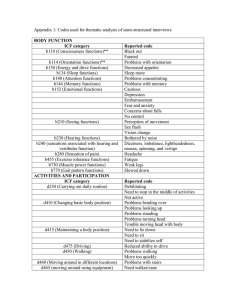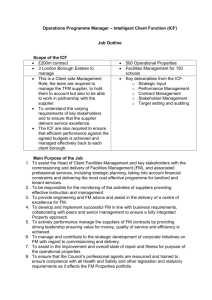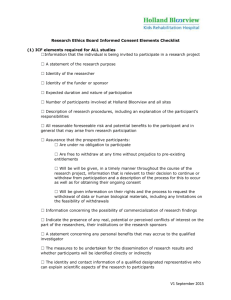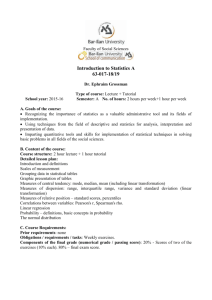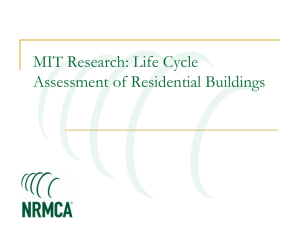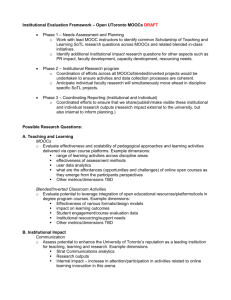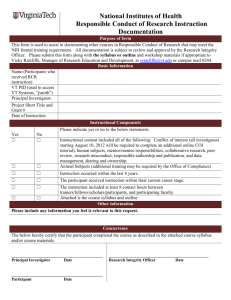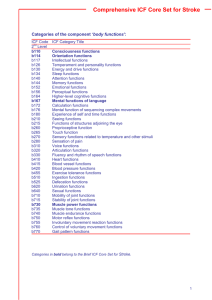Examples of Abstract Types The three examples are intended to
advertisement
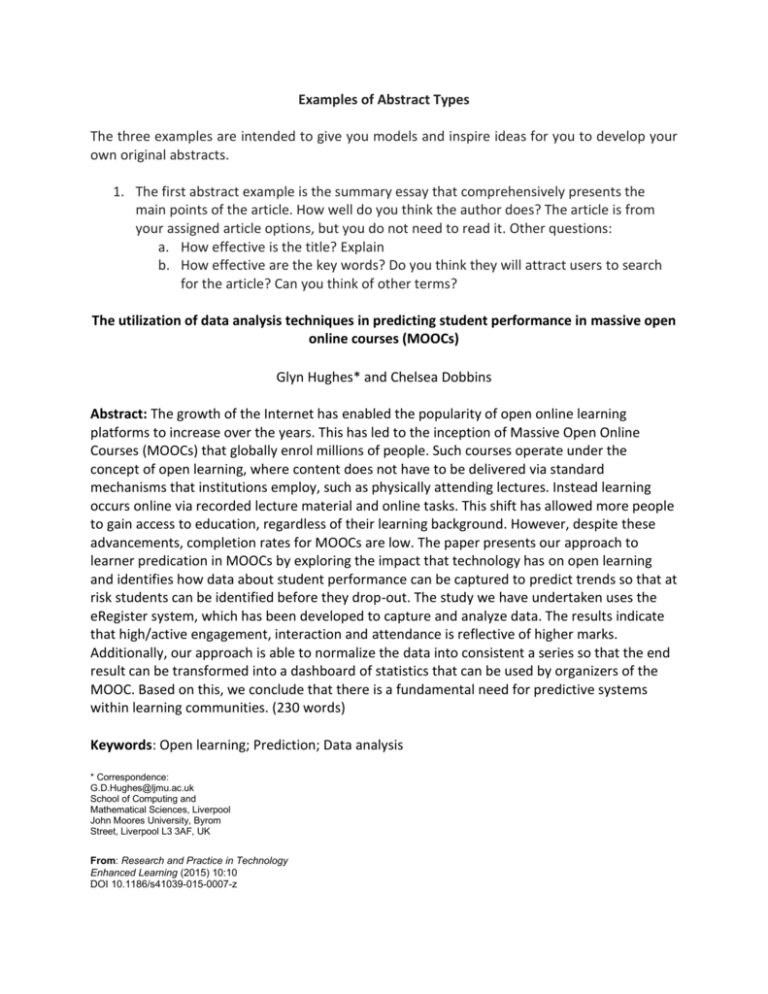
Examples of Abstract Types The three examples are intended to give you models and inspire ideas for you to develop your own original abstracts. 1. The first abstract example is the summary essay that comprehensively presents the main points of the article. How well do you think the author does? The article is from your assigned article options, but you do not need to read it. Other questions: a. How effective is the title? Explain b. How effective are the key words? Do you think they will attract users to search for the article? Can you think of other terms? The utilization of data analysis techniques in predicting student performance in massive open online courses (MOOCs) Glyn Hughes* and Chelsea Dobbins Abstract: The growth of the Internet has enabled the popularity of open online learning platforms to increase over the years. This has led to the inception of Massive Open Online Courses (MOOCs) that globally enrol millions of people. Such courses operate under the concept of open learning, where content does not have to be delivered via standard mechanisms that institutions employ, such as physically attending lectures. Instead learning occurs online via recorded lecture material and online tasks. This shift has allowed more people to gain access to education, regardless of their learning background. However, despite these advancements, completion rates for MOOCs are low. The paper presents our approach to learner predication in MOOCs by exploring the impact that technology has on open learning and identifies how data about student performance can be captured to predict trends so that at risk students can be identified before they drop-out. The study we have undertaken uses the eRegister system, which has been developed to capture and analyze data. The results indicate that high/active engagement, interaction and attendance is reflective of higher marks. Additionally, our approach is able to normalize the data into consistent a series so that the end result can be transformed into a dashboard of statistics that can be used by organizers of the MOOC. Based on this, we conclude that there is a fundamental need for predictive systems within learning communities. (230 words) Keywords: Open learning; Prediction; Data analysis * Correspondence: G.D.Hughes@ljmu.ac.uk School of Computing and Mathematical Sciences, Liverpool John Moores University, Byrom Street, Liverpool L3 3AF, UK From: Research and Practice in Technology Enhanced Learning (2015) 10:10 DOI 10.1186/s41039-015-0007-z 2. An example of a structured abstract. The abstract is also from one of our assigned article options, but you do not have to read the article. a. How effective is the title? Can you say it better? b. How effective are the key words? Do you think they will attract users? Can you think of others? An intelligent decision supporting system for international classification of functioning, disability, and health Wei-Fen Hsieh1, Lieu-Hen Chen1*, Hao-Ming Hung1, Eri Sato-Shimokawara2, Yasufumi Takama2, Toru Yamaguchi2, Eric Hsiao-Kuang Wu3 and Yu-Wei Chen4 Abstract Background: In recent years, the population structure in Taiwan has changed so dramatically. Based on concerns of social welfare issues, Taiwanese government began to seek principles for assessment of disability. After seven years of carefully evaluation, the World Health Organization’s International Classification of Functioning, Disability, and Health (Abbreviated to ICF) is officially adopted as Taiwan’s assessment standard while most of the assessment procedures of ICF are sophisticated, and time consuming. In this paper, we propose a sensor based decision supporting system for ICF. Our prototype system aims to reduce the burden of medical staffs, and to assist subjects to perform the assessments. Methods: This paper integrate multiple devices including ASUS XtionTM, temperature/acceleration/gyro sensors on Arduino, and Zigbee to measure the mobility of limbs and joints. The subject’s log of assessments is then recorded in the database so that the medical staffs can remote-monitor the condition of subjects immediately, and analyze the results later. Additionally, in our system, a user-friendly interface is implemented for the detection of dementia. Results: In this paper, three experiments have been conducted for different purpose. The experiment was conducted to compare the variation between thermometer and our device. Moreover, we invited 20 elders aged for 65 to 80 to use our system and all of them gave positive feedback. Two elders were invited to perform full assessment for dementia and the results show that both of them didn’t have sign of dementia. Also, the assessment of joint movement was performed by a 67 year-old elder and the result shows that the elder had well physical function and could take care of daily life. Conclusions: The proposed system has potential for aiding users to perform the ICF testing better and provide benefits to medical staffs and society. With current technology, integration between sensor network systems and artificial intelligence approaches will more and more important. We develop a simple interface for user to manipulate and perform the ICF assessment. In addition, the early detection of dementia likely has the potent Keywords: Social welfare; ICF; Arduino; Xtion Pro Live™; Sensoring technologies * Correspondence: lhchen@csie.ncnu.edu.tw 1Computer Science and Information Engineering, National Chi Nan University, Puli, Taiwan 3. An example of a Semi-Structured abstract (from the APA blog) a. Can you think of a better title for this abstract? b. Can you think of some effective key words? Gimme Structure Stephanie Abstract: Objective: In this study, we investigated the psychological effects of radical gamma-radiation-caused mutation and transformation to determine whether the transformation affects personality and mood as well as physicality. Method: The single participant filled out the Minnesota Multiphasic Personality Inventory—2 and other self-report measures assessing his state of mind, stress (Acute Stress Disorder Scale), and depression (Beck Depression Inventory). The participant was then asked to mediate an argument between 2 confederates, who had been told to not yield on any point of their entirely unreasonable positions. Once the participant had experienced a massive cellular shift triggered by adrenalin (“hulked out”), he (eventually) filled out the various self-report measures again. Results: The participant’s results showed significant differences in both personality and mood. Among other results, the participant maxed out his pre-transformation Hypochondriasis scale score, whereas the score bottomed out post transformation. Scores pre- and post-transformation were similar on the Paranoia scale, whereas Hypomania and Schizophrenia scale scores were low pretransformation and high post transformation. Stress and depression scores were high at both testing occasions, but we observed that the madder he got, the stronger his scores became. Conclusions: Gamma radiation changes people exposed to it psychologically as well as physically; it also affects mood. More research is needed to replicate these results; participant recruitment is underway. (215 words) Key Words: ??????????????? From: American Psychological Association, APA Blog, April 18, 2014, http://blog.apastyle.org/apastyle/abstracts/ (accessed 04.08.2015)
